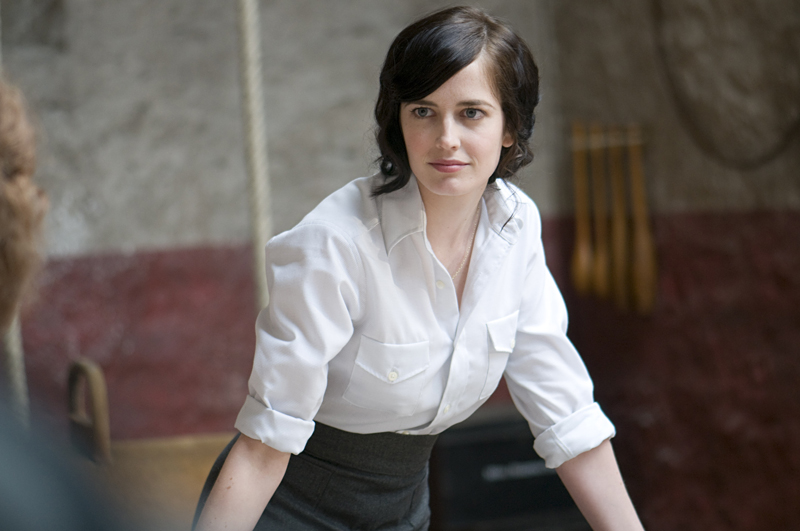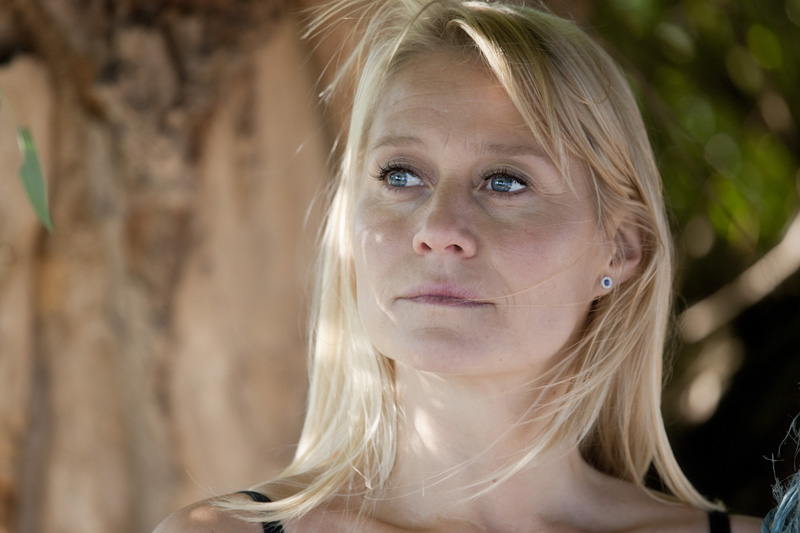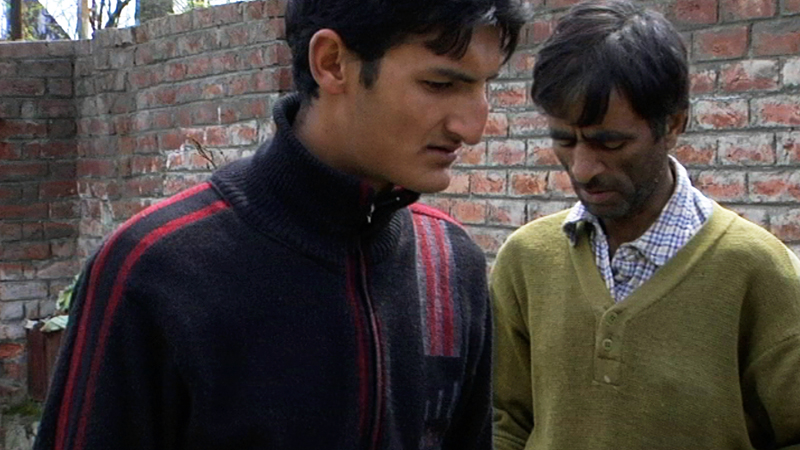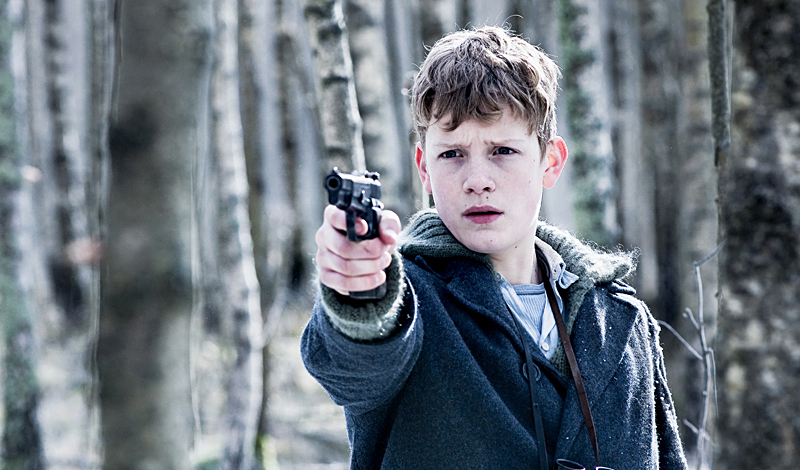Right before Marion Crane steps into the shower in Gus Van Sant’s dreary reconstruction of Psycho, the director adds his own bit of business to the scene in which she undresses, unaware that Norman Bates is watching her through a hole in the wall of Cabin No. 1. In Alfred Hitchcock’s Psycho, the sequence is critical: It marks the movie’s dizzying swerve away from the decoy story so far (the unhappy blond secretary has made off with $40,000 of her boss’s money and driven away to launch a new life) to begin its deep focus on the twisted mind of her killer. When, in the new version, Norman (played by a leering Vince Vaughn) jacks off furiously while spying on Marion (Anne Heche), it comes across as a dumb schoolboy prank, the vulgar contrivance of a panicked director under pressure to update a master of ambiguity for an unshockable new generation that’s seen everything.
Psycho
directed by Gus Van Sant
starring Vince Vaughn, Anne Heche
now playing at Metro, Oak Tree,
Pacific Place
To be sure, Hitchcock didn’t always disdain the explicit. Assuming he was making a movie for a freer-thinking, post-’50s mass audience, he opened Psycho with a half-clad Janet Leigh draped across a motel bed with her married lover. Left to himself, Hitchcock later told François Truffaut, he would cheerfully have spattered the walls of Cabin No. 1 with blood and stripped his morally flawed, physically perfect heroine to the buff, and to hell with the lacy black bra. The director swore that he made Psycho in black and white not for art’s sake, but because he anticipated that the censors would balk at blood flowing down the drain in living color. (In fact it was the flushing toilet that got to them.) Still, Hitchcock would very likely have become a virtuoso of wicked suggestion even had he not been compelled to find ways to fan the flames of audience prurience, terror, and desire without running afoul of the hysterically prudent film police. Though he claimed, perhaps disingenuously, to be primarily a technician of suspense who identified hardly at all with his characters (he cherished Psycho for its craftsmanship and—gloatingly—for its commercial success in the wake of a critical drubbing), Hitchcock understood that human motivation and sexuality have more than one layer. It would no more have occurred to him to write off Norman Bates as a dirty young man than to dismiss Marion Crane as a petty thief.
Van Sant seems hopelessly confused about whether he’s paying homage or reading anew, and the result is a dithery film, doggedly mimetic in its shot-for-shot remount and punctuated with a few rebellious tantrums of show-and-tell designed to take the movie into the ’90s. To his credit, Van Sant is wise enough to appreciate the futility of trying to make Psycho compete with the thrill ride that is today’s horror movie. However deftly evoked, a kitchen knife (even John Woo’s kitchen knife, borrowed for the occasion) slashing through a shower curtain will raise no more than a bleat of faux fright from a generation reared on amped-up special effects. One wonders what Universal—which after several ill-timed flops is doubtless counting on Van Sant to rescue its ailing box office with the kind of teen-friendly horror show that turned Scream into a cash cow right around this time of year—makes of this unaccountably wimpy offering from a director who has proved himself such a potent mischief-maker both in the mainstream (To Die For) and on the fringe (Drugstore Cowboy).
Every remake is inescapably also an innovation, but not every innovation counts as art. All the spiffy desaturated color in the world, plus the mostly wasted gifts of cinematographer Chris Doyle (who shot most of Wong Kar-Wai’s movies and is an ideal interpreter for Hitchcock’s fast-cutting shooting style), plus Danny Elfman’s rescoring of Bernard Herrmann’s screechy strings, plus a cast transparently picked for its Gen-X appeal, won’t add up to a movie unless the creator has something of his own to say. Joseph Stefano’s mildly tinkered-with screenplay is still so patently a creature of its time that the cast sound as though they’re reciting from a dated stage play dusted off by a superannuated acting coach. The actors appear to be completely adrift in a project that has no guiding conception. Viggo Mortensen interprets Marion’s lover, Sam, as a Texas lug with a near-presidential habit of laying his hands on forbidden fruit, while Julianne Moore, in the Vera Miles role as the dead woman’s worried sister, plays her as a ball-busting superbitch. Only William H. Macy, as the hard-working private eye Arbogast who meets his fate while trying to call on Mother Bates, plays his part straight. But with his baby-blue eyes and chipmunk cheeks and no apparent brief from his director, Macy lacks the faintly sinister menace of Martin Balsam that so nimbly threw moviegoers’ suspicions off track.
Van Sant’s most serious gaffe is to saddle his two leads with a snappy, up-to-the-minute sexuality that vacuums all the mystery out of them. For all Hitchcock’s professed detachment from his characters, there is much of him in both Marion Crane and Norman Bates. Not to mention Norman’s mother, who, to judge by Donald Spoto’s sympathetic but candid biography of Hitchcock, is a hysterical distillation of the director’s own demanding and intrusive parent. It’s no accident that Hitchcock’s medium was horror, a genre not known for its benign treatment of women. Yet Janet Leigh’s Marion Crane was more than a pair of pointy C-cups waiting to be savaged with the sadism that awaits every compromised Hitchcock heroine. Her huge eyes were dark with Hitchcock’s Catholic guilt, and a quiet despair that both drew Norman to her and marked her as a candidate for his stuffed-bird collection.
Hitchcock, who liked his leading ladies generously upholstered, would have taken one look at Heche’s waiflike figure and tiny breasts and dialed X for Pamela Anderson. Heche’s Marion, stripped of her guilt and her growing sympathy for Norman, is just another noir minx on the make. A versatile actress with an instinctive feel for the line where comedy and horror meet, Heche nonetheless turns in a performance so blandly one-note that by the time you see her platinum head under the showerhead, all you can think of is that her roots need doing. Just as when Vaughn’s Norman, freaked by all the snooping, bounds upstairs to haul Mother down to the fruit cellar, there’s nothing for us to do but appreciate, along with Van Sant, that the actor is a fine piece of ass.
In the end it’s Vaughn’s grinning mug that sinks the movie. For the emotional weight of Psycho belongs with its hopelessly split killer. With his bobbing Adam’s apple, snapping eyes, and flamingo frame, Anthony Perkins looked for all the world like one of the feathered friends that kept Norman company at the Bates Motel. The actor managed to convey at once an overgrown boy with no secrets who charms his visitors with candy, an emotionally crippled son of a fatally clutchy dominatrix, and a compulsively methodical murderer who cleans up the scene of the crime in real time. Hitchcock equally methodically set up a widening split in the viewer between identification with and terror of the perpetrator. When Perkins’ Norman stares through the hole at Marion disrobing, it’s up to us to imagine whether it’s out of lust or loathing, yearning for a prize he can never win, or even a tender protectiveness toward a woman with whom he has just traded confessions of vulnerability over milk and sandwiches. Norman’s impassive gaze is designed to implicate us, to make us feel slightly soiled as our fears and fantasies flutter over the scene. Vaughn, lifting wholesale from his recent turn as a smiling serial killer in the tiresome Clay Pigeons, could be any sexually incompetent young peep-ing Tom.
Devoid of any discernible inner life, Gus Van Sant’s stuffed owl of a movie sits there, stuck helplessly between stolid imitation and weak-kneed embellishment. And when at last the opportunity of a good laugh presents itself with the wildly simplistic summing-up speech by the prison shrink, poor Robert Forster is made to deliver it straight. Hitchcock would have chortled. I snored.







